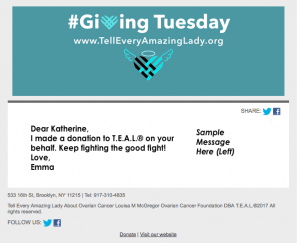Dr. Shieva Ghofrany knows firsthand what it’s like to be a patient with ovarian cancer. Now – about two and a half years out from her own diagnosis – she is committed to helping her patients be proactive, optimistic, and knowledgeable about their health.
As an obstetrician-gynecologist for nineteen years, Dr. Ghofrany has dedicated her career to helping women. She’s made it a point to inquire about unusual symptoms, recommend ultrasound tests when necessary, and let her patients know that Pap smears only screen for cervical cancer. After she was diagnosed with ovarian cancer in 2016, she continued to be an advocate for women’s health and learned exactly how important it is for patients to maintain positive energy, free of fear, regarding their own well-being.
In 2016 Shieva began experiencing painful periods, but chalked it down to a past history of endometriosis. Typically, she would have recommended that one of her patients get an ultrasound under similar circumstances. As she’s quick to point out, Dr. Ghofrany gives her patients the same advice she would give her mother or a sister. Yet, when it came to her own health, she decided to wait a couple of months before taking action.
Finally, she asked one of the technicians in her office to give her an ultrasound. After some additional tests, it turned out that Shieva had a rare condition – endometriosis in her ovary had developed into ovarian cancer. She had surgery, experienced an unexpected complication with her bladder, and received a diagnosis of stage 2 cancer.
Shieva stayed as positive as she could throughout her treatment—and she credits an optimistic attitude with helping her through that difficult time. As a doctor, she’s seen people face serious health challenges, and she knows that they’re just a natural part of life. All of us at some point will get sick, but as she found out herself, sometimes that opens us up to experiencing joy and the kindness of people around us even more fully. And importantly, our minds affect how we heal. Fearing the worst can lead us to delay treatment and cause our bodies to generate stress hormones that weaken the immune system over time.
Shieva completed six cycles of chemotherapy on November 9, 2016. In addition to feeling more appreciative of life in general, she’s noticed some specific changes since then. She continues to keep her hair super short and shaves it every three weeks. And as a doctor, she’s careful to pay even closer attention to how she communicates with patients. She avoids medical jargon so that patients understand exactly what she is saying. And she’s eliminated the language of fear when it comes to cancer.
Being proactive about one’s health, not paranoid or fearful, is the best approach to take, medically and emotionally. Get screening tests for cancer as your doctor recommends. If you have unusual symptoms, get them checked out. Finally, if you know someone who was diagnosed with cancer and you want to help, ask their friends or family what they suggest. Everyone wants something different—meals, flowers, visits, or text messages—so the easiest way to find out is to ask.
Written by Jennifer Moon




